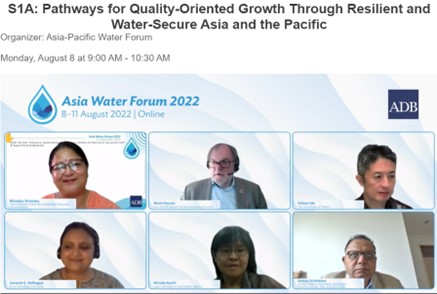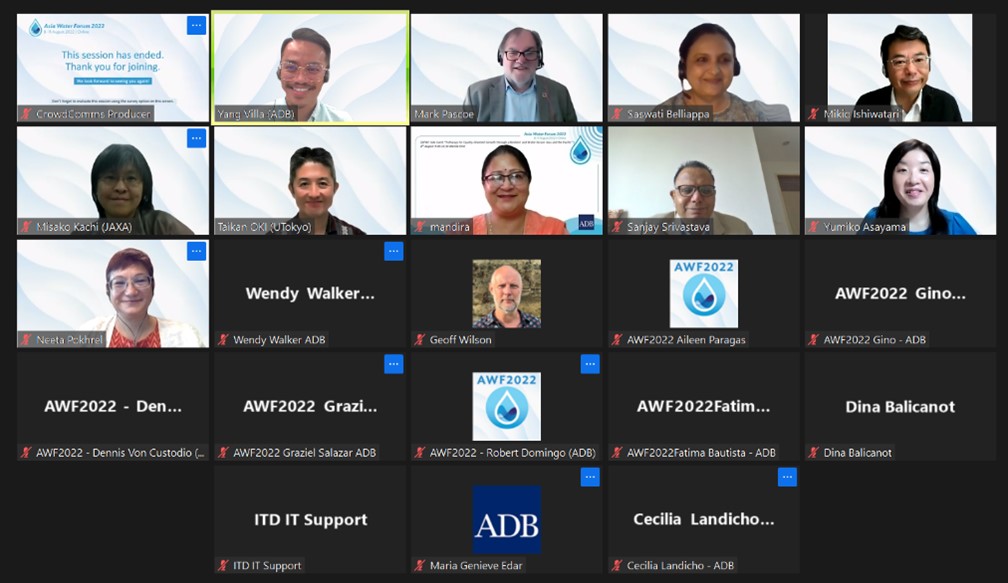Asia-Pacific Water Forum, which Japan Water Forum has served as the secretariat, organized the session about Pathways for quality-oriented growth through a resilient and water-secure Asia and the Pacific as the side event of the Asian Development Bank’s Asia Water Forum 2022 on 8th August 2022. To deal with the challenges in governance and finance for a quality-oriented society from a water perspective, each presenter and panelist presented the roles of science by introducing their projects and how their scientific knowledge could be used for informed decision-making. We then discussed the catalyst for integrating such scientific expertise and local socio-economic and environmental analysis for climate resilient and water-secure pathways and how we could nurture the talents, including youth, who can seek out locally-tailored approaches.
Ms.Yumiko Asayama, chief manager of Japan Water Forum, shared the three outputs of the 4th Asia-Pacific Water Summit (APWS): Kumamoto Declaration, Kumamoto Initiative for Water by the Japanese Government, and 4th APWS Chairs Summary. She highlighted the necessity for the transformation to conduct actual actions to enhance their continuous commitments and leadership by sharing knowledge, experiences, and lessons correcting and making the cases suitable for varieties of local conditions of Asia and the Pacific. She thus asked the speakers and panelists to discuss the pathways by sharing their practices and lessons.
Prof.Taikan Oki, a professor at the University of Tokyo, presented how hydrology would help achieve water security. He explained hydrology contributes to society by providing reliable:
- dataset of past and current global/local hydrological cycles,
- near-real time to seasonal predictions of weather/climate, and
- future hydrological cycles under climate change.
Hydrology contributes to society by giving answers to:
- Identify effective measures to be taken to secure the water supply, mitigate potential flood risks, improve water quality, and protect and/or restore aquatic ecosystems.
- Quantitative estimates of how much water is (and will be) really available for water withdrawal/consumption for human beings.
Demonstrating his research outcomes focused on Asia, he highlighted the four recommendations: (1) We cannot solve any issue we cannot sense, (2) water is the focal point of sustainable development, (3) water is a pilot; integrate and lead our world for the better future, and (4)smooth exchanges of knowledge and technologies through global partnerships based on multilateralism is critically relevant for implementing applicable and efficient adaptation measures to climate change.
Dr. Sanjay Srivastava, Chief of Disaster Risk Reduction, UNESCAP, firstly introduced the three trends of quality of growth, resilience, and water security in Asia. Presenting the cases of the Aral sea and India, he emphasized the three pathways for quality-oriented growth: (1) implementation of the five adaptation priorities for managing and mitigating in-land water disastersin the Aral Sea that also support simultaneous progress on multiple SDGs; (2) adoption of water-energy-food nexus approach for resilient water infrastructure; (3) capitalizing on Science, Technology, Innovation for localizing SDGs
Dr. Misako Kachi, Senior Researcher, Earth Observation Research Center Japan Aerospace Exploration Agency (JAXA), explained the critical roles of Earth Observation Satellites in water-related disaster management in Asia and the Pacific. She presented the JAXA’s approaches, such as DAICH-II and Global Satellite Mapping of Precipitation (GSMaP). She also shared the JAXA’s future earth observation missions till 2024. She highlighted satellite data is useful if we can use it properly and everyone can access the data, and locally tailored capacity building on the ground is critical.
Dr. Mandira Shrestha, Programme Coordinator: Climate Services ICIMOD, shared the issues of the Hindu Kush Himalayan (HKH) region, including the impacts of climate change and disaster. She highlighted the data and information is critical as it empowers decision-makers at different levels to manage the risks and opportunities of climate variability and climate change. She emphasized the pathways for quality-oriented growth in the HKH region are:
- Harmonization of climate data and information, standardization and risk assessment methodologies to enhance climate resilience
- Build capacity to improve the adaptive capacity to climate change
- Use of science and technology: EO and geospatial tools for monitoring, assessing, and forecasting
- Develop gender responsive climate services for better risk preparedness
- Co-create innovative, inclusive and proven solutions to understand, interpret and use for informed decision making
- Enhance partnerships and regional cooperation
Ms. Sasawati Belliappa, Senior Safeguards Specialist, ADB, introduced the ADB’s operations and projects in this field, including the Japan fund project for poverty reduction that supports resilience in social inclusion and gender equality, with the introduction of the cases of India, Bangladesh, and Nepal. She also briefly presented the Asia-Pacific Water Resilient Hub, which the ADB will launch on the last day of the Asia Water Forum 2022.
In the panel discussion, each speaker discussed challenges and key elements to attain quality-oriented growth through a resilient and water-secure Asia and the Pacific. Transboundary corporations and collaboration are also critical in Asia and the Pacific, even in addressing floods, droughts, and storms. There needs to be more effort to share knowledge and experience to address the challenges. The speakers also highlighted that increasing climate risk is one of the biggest challenges in climate resilience design. It is essential to think about mainstreaming gender right from the beginning, and providing climate information services from a gender perspective will ensure better preparedness for disaster risks.
In reaction to the presentation and panel discussion, Dr. Mikio Ishiwatari, The Board Director of Japan Water Forum, emphasized that science & technology is crucial and essential in promoting quality growth. Financing and governance are key accelerators identified in the Kumamoto Declaration.
This session concluded that a more robust climate risk assessment is needed, examining social changes. It is critical to build an end-to-end system that links scientific knowledge with policy and diverse stakeholders, considering social and cultural perspectives are the keys to addressing water challenges and transforming into a quality-oriented society.
Program
|
Opening Remarks |
|
Keynote Lecture |
|
Presentation to discuss the Q1 and Q2 (each 7 mins) |
|
Panel Discussion Reaction after the panel discussion |
|
Wrap-up and Closing Remarks |


(Reported by Yumiko Asayama, Chief manager (international affairs), Japan Water Forum)
